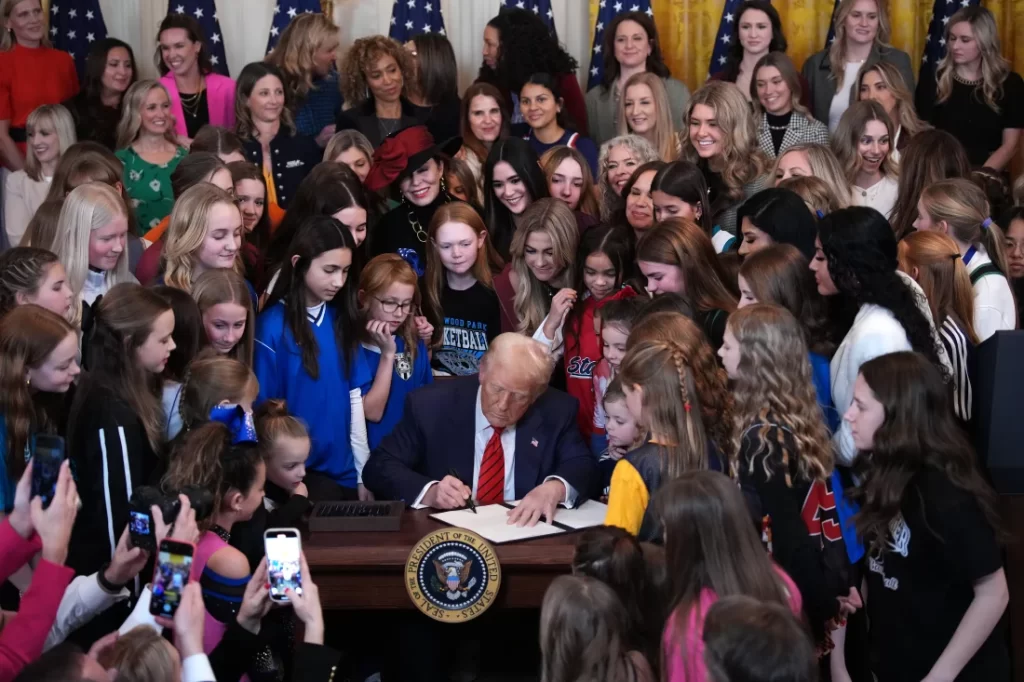Trump Signs Executive Order on Women’s Sports
On Wednesday, President Trump followed through on a significant campaign commitment by enacting the “No Men in Women’s Sports Executive Order.” This directive explicitly prohibits individuals who were not assigned female at birth from competing in women’s sports.
Timed Coincidentially
The signing of this executive order coincided with National Girls and Women in Sports Day on February 5th, highlighting its relevance to the celebration of female athletes.
A Central Campaign Issue
This issue was a focal point during Trump’s campaign, particularly in relation to transgender rights. In a White House press conference after the signing, Trump asserted, “The radical left has waged an all-out campaign to erase the very concept of biological sex and replace it with a militant transgender ideology.”
Transgender Athletes in the Spotlight
The topic of transgender women participating in women’s sports has gained notable traction among conservative lawmakers and media outlets over the past year, especially with the upcoming 2024 Olympics. A case that drew particular attention was Algerian boxer Imane Khelif, who secured a gold medal in Paris last summer. Controversy erupted when her opponent, Italian Angela Carini, withdrew mid-fight, claiming Khelif had an unfair advantage due to being transgender.
Khelif, who was assigned female at birth and identifies as female, had to furnish photographic evidence to disprove the allegations. Although Carini eventually retracted her statements, misleading claims about Khelif’s gender continue to circulate, perpetuated by media figures and even President Trump.
Additional Misunderstandings
Similar misinformation has been spread about other female athletes, such as Katie Ledecky, Ilona Maher, and WNBA player Caitlin Clark, all of whom identify as female and were assigned female at birth.
Notable Athlete Controversies
Another athlete who faced scrutiny was Lia Thomas, a swimmer at the University of Pennsylvania who won an Ivy League championship and set multiple conference records in 2022. Her success ignited significant debate, propelling the rights of trans athletes into mainstream political discourse. Despite ongoing legal battles that permitted her records to stand, Thomas was ultimately unable to fulfill her lifelong dream of Olympic participation.
Legal Actions Following the Order
In the wake of Trump’s executive order, three of Thomas’ former UPenn teammates have filed a lawsuit against her and the university, seeking to have her championship title revoked.
The Representation of Transgender Athletes
Despite the extensive discussions surrounding transgender individuals in collegiate sports, only 10 out of approximately 530,000 NCAA student-athletes identify as a gender different from the one assigned at birth, representing about 0.000019% of the total athlete population.
NCAA Response
Following the executive order, the NCAA adjusted its policies regarding transgender athletes. NCAA President Charlie Baker expressed support for Trump’s order, stating it offers “clear, consistent, and uniform eligibility standards.” As a result, transgender women may practice with women’s teams but cannot participate in competitions.
Investigations into Title IX Violations
This executive order instructs the Department of Education to assess federally funded schools and colleges for potential Title IX violations related to discrimination based on sex in education. Subsequently, the Department announced investigations into three institutions for potential infractions: San Jose State University (which has reportedly faced unverified claims about a trans athlete on its volleyball team), the Massachusetts Interscholastic Athletic Administration, and the University of Pennsylvania, Lia Thomas’ former school.
Reactions from Advocacy Groups
LGBTQ+ and transgender rights advocates have condemned the executive order, criticizing it as a form of legalized discrimination. Marcelle Afram, a transgender rights activist, stated to the BBC, “[Trump’s executive order] is a blatant attack on trans rights and feeds into the culture war of anti-trans hysteria.” She emphasized that it represents an effort to control trans bodies and further marginalizes an already vulnerable community.


